Baltic States and Indiana
A significant amount of unrealized economic potential in today's global economy lies in Eastern Europe. This article focuses on Lithuania and is the first in a multi-part series to explore the economic relationship of the three Baltic States (see “Rapid Change in the Baltics” below) with the United States, and Indiana in particular.
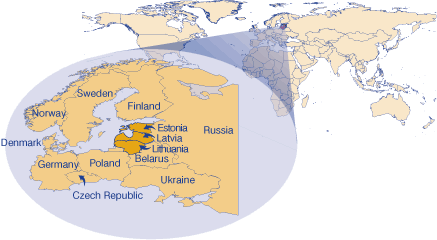
The Republic of Lithuania is the largest of the three Baltic States in terms of population, territory and economy. With 25,212 square miles of land, it is a little smaller than Indiana, but larger than Belgium, Denmark, the Netherlands and West Virginia.
A little less than 3.6 million people live in Lithuania, which is located between Latvia, Belarus, and Poland, just West of Russia. Lithuanians make up 83 percent of the population, with large groups of Polish and Russians, in addition to other ethnic groups.
On March 11, 1990, Lithuania was the first of the Soviet republics to declare independence. After major economic restructuring, Lithuania was admitted to NATO in the spring of 2004 and a few months later to the European Union (EU).
Economy
Between the second quarter of 2006 and the same quarter a year earlier, Lithuania's gross domestic product (GDP) grew an astounding 9 percent (though admittedly from a relatively small base), according to preliminary Eurostat data. (1) This growth outpaced all other EU member states, followed by Slovakia (6.6 percent), Poland (5.6 percent) and Sweden (5 percent). For comparison, the EU averaged over-the-year GDP growth of 2.8 percent and the United States came in at 3.6 percent for the same time period.
More than 80 percent of Lithuanian enterprises have been privatized and the economic climate is well-suited for foreign direct investment (FDI). In fact, since gaining independence, FDI has increased 18.6 percent (using 2005 data). Roughly 37 million people live within a 300-mile radius of Vilnius (Lithuania's capital), meaning it has big economic potential in Eastern Europe (see Figure 1). Many are investing in Lithuania in order to access the broader EU and Russian markets.
Figure 1: Population of Countries within a 300-Mile Radius of Vilnius, 2005
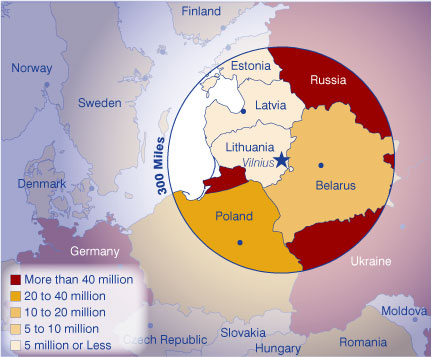
Lithuania ranks 15 out of 155 countries with regard to its investment climate, indicating that the regulatory environment is quite conducive to business. The World Bank report Doing Business in 2006: Creating Jobs indicates that Lithuania provides some of the easiest conditions for starting and developing businesses in the region. (2) On average, entrepreneurs can expect the process to take 26 days to go through eight steps to launch a business, at a cost equal to 3.3 percent of gross national income per capita; meanwhile, in Europe and Central Asia, it takes an average of 32 days, almost 10 steps, and costs 14.1 percent of income per capita.
Volvo, SAAB, Volkswagen, Siemens, Renault, Samsung, Ikea, Adidas, Mars Inc., and Coca-Cola are just a few of the companies that have expanded operations into Lithuania. Indianapolis-based Eli Lilly also has a distribution presence in the country.
Denmark, Sweden, Russia, Germany, Estonia, Finland, the Netherlands and the United States are the major investment partners (see Figure 2). The dominant FDI activities for 2005 were manufacturing, wholesale and retail trade, financial intermediation, transportation and communication, and real estate (see Figure 3).
Figure 2: Cumulative FDI by Country, January 1, 2006
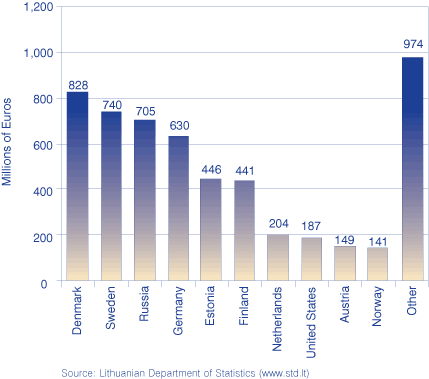
Figure 3: Percent of Total FDI by Activity, January 1, 2006
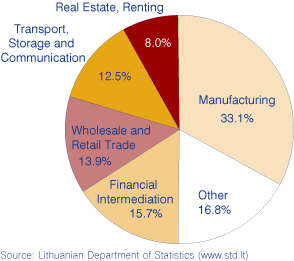
Trade
In 2005, Lithuanian exports grew 27.1 percent from the previous year, while imports into the nation increased 25 percent. Lithuania is a member of World Trade Organization, enabling it to conduct trade with other global partners under unified terms and conditions. Even though Russia is one of Lithuania's main trading partners, it heavily orients its trade toward Western Europe (see Figures 4 and 5). Mineral products made up the bulk of exported items (28 percent), with machinery, textiles, transportation and chemicals rounding out the top five in exports. Looking at imports, mineral products once again came in at the top of the list (26 percent), with machinery, vehicles, chemicals and metals in the top five.
Figure 4: Exports from Lithuania to Each Country, 2005
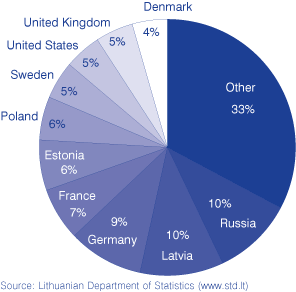
Figure 5: Imports into Lithuania from Each Country, 2005
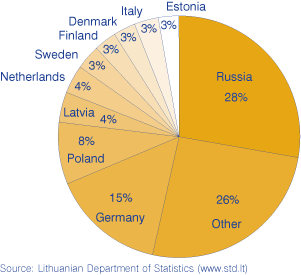
Trade between Lithuania and the United States is rapidly growing. In 2005, the United States imported $633.9 million of Lithuanian products (see Figure 6). The main imported goods were mineral fuel, oil, mineral wax, wood and articles of wood, furniture, bedding, lamps, apparel articles and accessories, photo, and medical and surgical instruments.
Figure 6: Imports from Lithuania to the United States
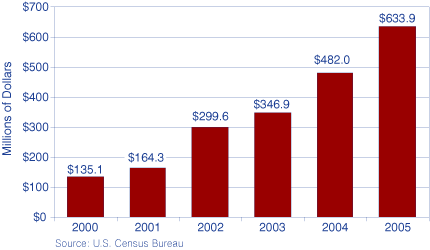
Unfortunately, it is complicated to obtain information about the actual imports into Indiana due to the multiple locations of entry into the United States, but we can look at what Indiana exported to Lithuania (see Figure 7).
Figure 7: Indiana's Exports to Lithuania, 2005
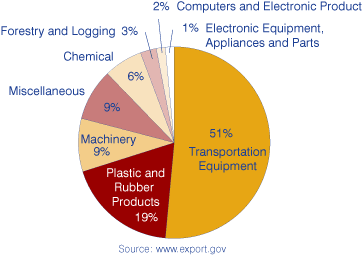
Indiana ranked 15th among states, with a total of $4.7 million in goods exported to Lithuania in 2005. Leading the nation at about $45 million were New Jersey (whose imports tripled from $16 million) and Illinois (who actually fell from a record high of $61 million in the previous year).
Economists and politicians have high expectations regarding Lithuania's potential. Some of them draw analogies with Ireland and its success in the European Union. Lithuania and Ireland have many similarities in history, nature and character, especially in their passion for work and innovation. For its success, The Economist, a leading source of economic news and information, labeled Lithuania the “Baltic Tiger.” (3) Time will show if Lithuania can repeat the economic growth story of Ireland, the Celtic tiger, which has not only caught up with, but has eclipsed other European nations.
Migrating from Lithuania
Outbound migration from Lithuania to elsewhere in the world has intensified, with a current rate of -0.71 per 1,000. Coupled with a low birth rate, the labor force remains one of the biggest problems to all three Baltic States. The Baltic States attempt to remain attractive to investors by increasing the level of education of its population.
Lithuanian migration to the United States started as two major waves during the two world wars, and a third wave that started in the early 1990s continues today. Unfortunately, it is impossible to accurately track the number of Lithuanian immigrants residing and working in the United States. However, Census 2000 does tell us that almost 660,000 people in the United States reported Lithuanian ancestry, with about 10,051 of those living in Indiana.
Sidebar: Rapid Change in the Baltics
The Baltic States (Lithuania, Latvia and Estonia) earn their name because they border the Baltic Sea. After gaining their independence from the Soviets in the early 1990s, the Baltic States faced a long and difficult road of reforms, rapidly shifting from a command economy to a market economy. That, along with the speedy democratization of the region, opened doors to a number of international economic and political organizations.
One of the greatest achievements of the Baltic States was the accession to the European Union (EU) in 2004. Negotiations between the Baltic States and the EU started in 2000 and were completed in 2002, resulting in EU accession treaties. The EU membership benefits were instant: participation opened borders to Baltic labor migration and liberalized and intensified trade between Baltic States and the rest of the EU members. The Baltic Region became more attractive to foreign investors. (For now, the Baltic States are mostly the recipients of foreign direct investment rather than investors themselves.)
Inflation remains a problem for the Baltic States, which have some of the highest rates in the region. In July 2006, they far surpassed the EU average, which had annual inflation of 2.4 percent (Lithuania: 4.4 percent, Estonia: 4.5 percent, and Latvia: 6.9 percent).
According to the initial plan of the EU and the Baltic States, they were supposed to adopt the euro and become part of the Euro area on January 1, 2007 (after meeting certain requirements). However, lowering inflation was one requirement, so joining the Euro area will likely be in 2009 for Lithuania and Latvia and at least that long for Estonia.
Notes
- Statistical Office of the European Communities, available online at http://ec.europa.eu/eurostat/.
- World Bank and International Finance Corporation, “Doing Business in 2006: Creating Jobs,” available online at www.doingbusiness.org/documents/DoingBusines2006_fullreport.pdf
- “Baltic Tiger,” The Economist, 17 July 2003, available online at www.economist.com/displayStory.cfm?story_id=1929205.
Additional Resources
- Washington Diplomat, available online at www.washdiplomat.com.
- Ministry of Economy of The Republic of Lithuania, “Review of Economic and Social Situation in the Republic of Lithuania in 2005” February 2006.
- European Union, available online at www.europa.eu.
- Lithuanian Development Agency, available online at www.orangeprojects.lt/en/.
- Ministry of Economy of The Republic of Lithuania, available online at www.ukmin.lt.
- Lithuanian Department of Statistics, available online at www.std.lt.
- Audrius Bruzga, “Lithuania in the Baltic Sea Rim after EU Enlargement” Bimonthly Review 5 of Baltic Rim Economies.
Edita Ubartaite, International Development Manager
Indiana Economic Development Corporation
